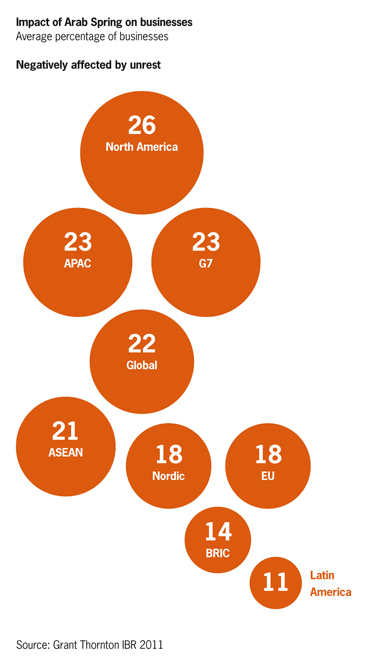Political and social turmoil often disrupt business operations. And when we’re talking about revolutions like those seen throughout the Middle East in 2011, those disruptions — and the associated costs — amplify.
The Financial Times is here to provide some examples of just how much damage some companies have suffered. The start by noting a Grant Thornton survey from June that claims a whopping 22% of the world’s companies were affected by the Arab Spring. Globalization indeed.
International companies in sectors such as retail, travel and construction have unsurprisingly been early losers.
In July, Thomas Cook, the tour operator, said it expected operating profits this year of just £320m – compared with analysts’ estimates of £380m – because of declining business in Egypt, Tunisia and Morocco.
Cyril Sweett, a British consultancy and property company, warned last month that its next financial results would be hit because Middle Eastern turmoil had led to a number of projects being scrapped.
Other companies are struggling to collect payment for bills for projects disrupted by protest, armed conflict or regime change.
Dana Gas, a fuel producer heavily dependent on Egypt, is owed 0m by the country for invoices related to natural gas sales, according to Ahmed Al-Arbeed, chief executive, adding that some will be repaid this year.
online pharmacy isofair with best prices today in the USARentokil Initial, the pest-control to cleaning services company, said it would be “nice to get back” £4.8m it says it is owed for a rat-catching contract signed while Colonel Muammer Gaddafi was still in power in Libya, although it is as yet undecided on whether to revive its operations in the country.
Great anecdotes to help show the depth of the problem. And on the macro-level, here’s an infographic from Grant Thornton listing what percentage of companies in different regions have been negatively affected by the uprisings.

